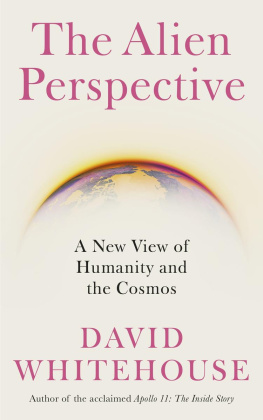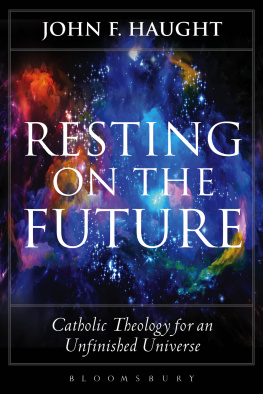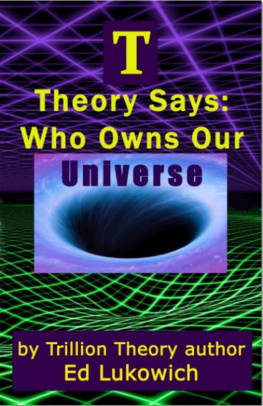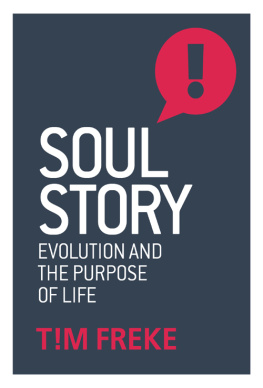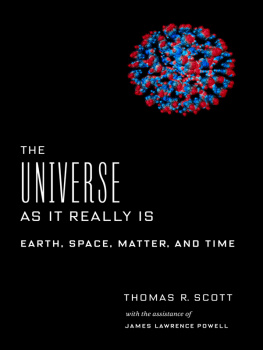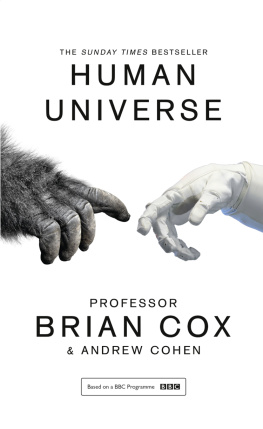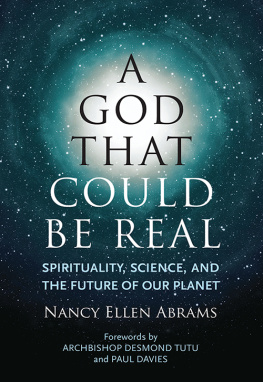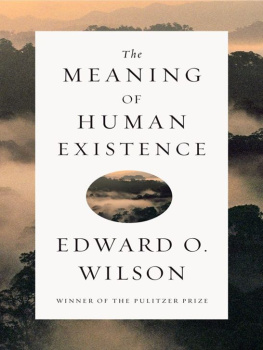THE TERRY LECTURES
The New Universe and the Human Future
OTHER VOLUMES IN THE TERRY LECTURES SERIES AVAILABLE FROM
YALE UNIVERSITY PRESS
The Courage to Be Paul Tillich
Psychoanalysis and Religion Erich Fromm
Becoming Gordon W. Allport
A Common Faith John Dewey
Education at the Crossroads Jacques Maritain
Psychology and Religion Carl G. Jung
Freud and Philosophy Paul Ricoeur
Freud and the Problem of God Hans Kng
Master Control Genes in Development and Evolution Walter J. Gehring
Belief in God in an Age of Science John Polkinghorne
Israelis and the Jewish Tradition David Hartman
The Empirical Stance Bas C. van Fraassen
One World: The Ethics of Globalization Peter Singer
Exorcism and Enlightenment H. C. Erik Midelfort
Reason, Faith, and Revolution: Reflections on the God Debate Terry Eagleton
Thinking in Circles: An Essay on Ring Composition Mary Douglas
The Religion and Science Debate: Why Does It Continue?
Edited by Harold W. Attridge
Natural Reflections: Human Cognition at the Nexus of Science and Religion
Barbara Herrnstein Smith
Absence of Mind: The Dispelling of Inwardness from the Modern Myth of the Self
Marilynne Robinson
Islam, Science, and the Challenge of History Ahmad Dallal
The New Universe
and the
Human Future
How a Shared Cosmology
Could Transform the World
NANCY ELLEN ABRAMS AND JOEL R. PRIMACK

Published with assistance from the foundation established in memory of
Philip Hamilton McMillan of the Class of 1894, Yale College.
Copyright 2011 by Abrams & Primack, Inc.
All rights reserved.
This book may not be reproduced, in whole or in part, including illustrations, in any form
(beyond that copying permitted by Sections 107 and 108 of the US Copyright Law and except
by reviewers for the public press), without written permission from the publishers.
Yale University Press books may be purchased in quantity for educational, business,
or promotional use. For information, please e-mail sales.press@yale.edu
(US office) or sales@yaleup.co.uk (UK office).
Designed by James J. Johnson.
Set in Linotype Centennial by Tseng Information Systems, Inc.
Printed in the United States of America.
Library of Congress Cataloging-in-Publication Data
Abrams, Nancy Ellen, 1948
The new universe and the human future : how a shared cosmology could
transform the world / Nancy Ellen Abrams, Joel R. Primack.
p. cm. (The Terry lectures series)
Includes bibliographical references and index.
ISBN 978-0-300-16508-1 (hardback)
1. CosmologyPhilosophy. 2. LifeOriginPhilosophy. I. Primack, J. R. (Joel R.) II. Title.
QB981.A343 2011
523.101dc22
2010044895
A catalogue record for this book is available from the British Library.
This paper meets the requirements of ANSI/NISO Z39.481992
(Permanence of Paper).
10 9 8 7 6 5 4 3 2 1
To Samara Bay and her fellow artists,
in whose hands rests the portrayal of
the new universe and the human future
The Dwight Harrington Terry Foundation Lectures on
Religion in the Light of Science and Philosophy
The deed of gift declares that the object of this foundation is not the promotion of scientific investigation and discovery, but rather the assimilation and interpretation of that which has been or shall be hereafter discovered, and its application to human welfare, especially by the building of the truths of science and philosophy into the structure of a broadened and purified religion. The founder believes that such a religion will greatly stimulate intelligent effort for the improvement of human conditions and the advancement of the race in strength and excellence of character. To this end it is desired that a series of lectures be given by men eminent in their respective departments, on ethics, the history of civilization and religion, biblical research, all sciences and branches of knowledge which have an important bearing on the subject, all the great laws of nature, especially of evolution also such interpretations of literature and sociology as are in accord with the spirit of this foundation, to the end that the Christian spirit may be nurtured in the fullest light of the worlds knowledge and that mankind may be helped to attain its highest possible welfare and happiness upon this earth. The present work constitutes the latest volume published on this foundation.
Contents
Acknowledgments
A great thank you to Priyamvada Natarajan and the other members of the Terry Lectures committee at Yale University for so graciously hosting us in New Haven in October 2009 for the two weeks of our Terry Lectures, and to Lauralee Fields for making it all run amazingly smoothly. More thanks to our agent, Douglas Carlton Abrams, whose advice and help are invaluable, and to our wonderful and tireless assistant, Nina McCurdy, for her careful work assembling our many figures and artistically creating several of them. Thanks and thanks and ever thanks to our brilliant daughter, Samara Bay, whose editing has been a window not only into the English language but also into the artistry of storytelling and the outlook of her generation. To our manuscript editor, Laura Jones Dooley, much appreciation for her careful work and bubbling enthusiasm. And finally, to our dream editor at Yale University Press, Jean E. Thomson Black, who has understood the deepest goals of this book from the start and fought for us: we know how lucky we are, and were immensely grateful.
Introduction
There is a gaping hole in modern thinking that may never have existed in human society before. Its so common that scarcely anyone notices it, while global catastrophes of natural and human origin plague our planet and personal crises of existential confusion plague our private lives. The hole is this: we have no meaningful sense of how we and our fellow humans fit into the big picture. Are we the handiwork of a loving God who planned the universe? Are we insignificant motes marooned on a lonely rock in endless space? In every culture known to anthropology, people could have answered questions like these with confidence, even though their answers would probably seem quaint or absurd to us now. They knew what their cosmos was like because they lived in a world where everyone around them shared it. We dont.
Despite all weve gained in this scientific age, weve lost something important. Even in a roomful of neighbors, its highly unlikely that everyone will have the same mental picture of large-scale reality and even more unlikely that any of their pictures is based on real evidence. Were divided on the most fundamental question of any society: what universe are we living in? With no consensus on this question and no way even to think constructively about how we humans might fit into the big picture, we have no big picture. Without a big picture we are very small people.
Many religious believers are convinced that the earth was created as is a few thousand years ago, while many people who respect science believe that the earth is just an average planet of a random star in a universe where no place is special. Neither is right. Both groups are operating within mental pictures of the universe that we now know scientifically are wrong. Meanwhile, global problems are escalatingreligiously justified brutality, exhaustion of planetary resources, climate chaos, economic disasters, and more. We function day to day in a high-tech, fast-paced world, but modern technology for billions of users is essentially magical. Astronomy appears to have little relevance. People think of astronomical discoveries as inspiration for kids or a great topic for five minutes of clever dinner party banter, but theres no widely understood connection between whats happening in distant space and us, right here. The truth is, however, that there is a profound connection between our lack of a shared cosmology and our increasing global problems. Without a coherent, meaningful context, humans around the world cannot begin to solve global problems together. If we had a transnationally shared, believable picture of the cosmos, including a mythic-quality story of its origins and our originsa picture recognized as equally true for everyone on this planetwe humans would see our problems in an entirely new light, and we would almost certainly solve them. Getting from here to there is what this book is about.
Next page

